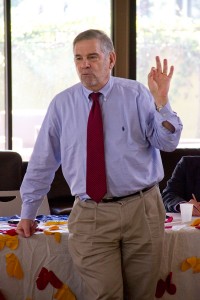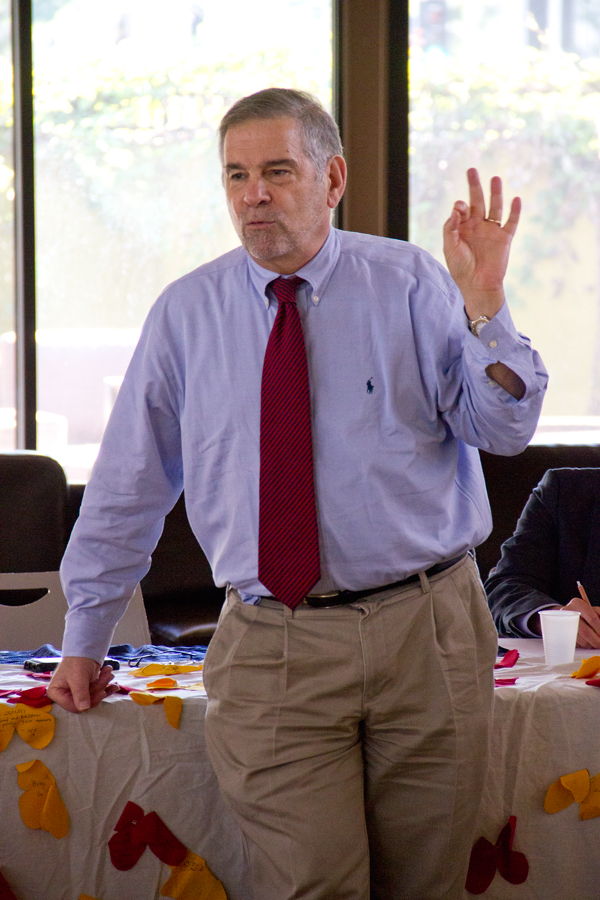Ceremony held to remember the Holocaust
On Monday evening, USC Hillel hosted “Remembering the Holocaust: A Yom Ha’Shoah Ceremony” as part of USC’s Genocide Awareness Month.

Examining history · Professor Michael Berenbaum spoke on how he became involved in Holocaust research during Monday’s event. – Austin Vogel | Daily Trojan
The event, which began with a short religious ceremony in memory of the 6 million Jewish Holocaust victims, included the lighting of six candles — one for each million killed.
Following this was a panel on the Holocaust led by Dan Leshem, the USC Shoah Foundation associate director of research.
Yom Ha’Shoah, or Holocaust Remembrance Day, began Sunday evening and ended Monday evening. The day was established in 1953 to commemorate the approximately 6 million Jews who died during the Holocaust as a result of the actions of Nazi Germany.
Monday’s panelists included child Holocaust survivor Henri Slucki, executive director of the Los Angeles Holocaust Museum Samara Hutman and American Jewish University Professor Michael Berenbaum.
Slucki, who was living in Paris when the Nazis invaded, said each Holocaust testimonial is unique in its own special way.
“No two survivors have identical stories,” Slucki said.
He then went on to explain his story. Though born in Paris, Slucki moved to southern France when his father was discharged from the French army. On Aug. 26, 1942, the French government rounded up the Jews, and at 6 a.m., he heard a terrible knock at his family’s door. Slucki and his family, however, did not answer.
“Had that door opened, I would have been taken away,” he said.
After the incident, he and his family escaped to Spain, where he would eventually be sent to the United States without his parents as part of the U.S. transport system, Kindertransport, which rescued Jewish children.
Berenbaum, who has served as former deputy director of the President’s Commission on the Holocaust, project director for the United States Holocaust Memorial Museum and president and CEO of the Survivors of the Shoah Visual History Museum, spoke of the importance of the Holocaust and commemorating those who were killed.
“Of all the ancient people who had been defeated, the only people with real continuity, who can trace their ancestry for a long period of time, are these crazy people called the Jews,” Berenbaum said.
While he was completing his doctorate in Holocaust studies, there were only two institutions in the United States that offered such a degree. Moreover, when he started teaching about the Holocaust, the number of professors working in Holocaust studies could fit into one phone booth, Berenbaum said.
“Coming to grips with Jewish history is to touch levels of depth, passion, eternity and struggles,” he said. “The Holocaust is unique in that most people deal with life or death once or twice in their life. People in the Holocaust lived with the ultimate threat of life or death not once or twice, but as part of a daily routine.”
Working in the early days of the Shoah Foundation, Berenbaum’s task was to spread the voices of those impacted by the Holocaust. He said that studying and remembering the Holocaust is ultimately a part of his destiny.
“Fate is very often something that happens,” Berenbaum said. “Destiny is that moment when you realize that what happens to you is the purpose for which you were intended. If you’re lucky then you find that your fate equals, comes to terms with or meets your destiny. My task in life was to give a voice to that which could not be told to me [when I was younger],” Berenbaum said.
Essentially, Berenbaum believes filming Holocaust survivors gives a sense of permanence to their stories.
“[The videos] give them an immortality because their words will live beyond their human existence,” he said.
A topic brought up during the panel was the sense of urgency, as the current generation will be the last to be able to personally communicate with Holocaust survivors.
Sam Fein, student president of USC Hillel, stressed the importance of talking to Holocaust survivors.
“We are 70 years out from the Holocaust now,” Fein said. “There are not that many survivors left, so it is a privilege and honor to hear their stories.”
Slucki also recognized the urgency of teaching about the Holocaust and telling his unique story.
“The time is running out,” Slucki said. “We are a group of individuals that are dwindling down. If none of us were to let our stories be known, then those events will be buried with us. After a person dies, there are no more questions you can ask or get answered, This is the time to ask the questions.”

